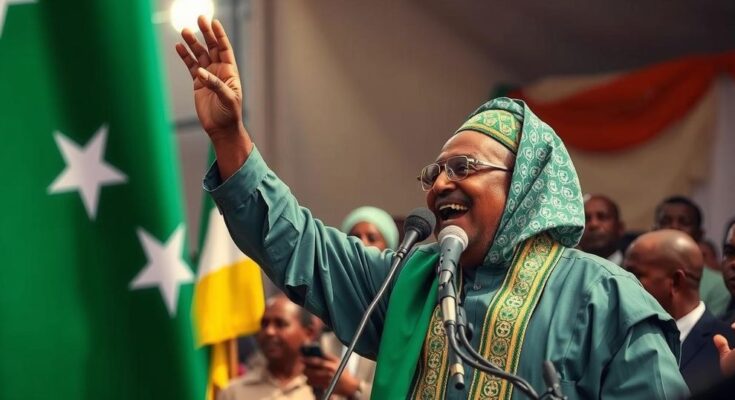Abdirahman Mohamed Abdullahi, leading the Waddani Party, has won the presidential election in Somaliland, securing nearly 64 percent of the votes against incumbent Muse Bihi Abdi. The election, which was postponed due to financial challenges, emphasizes Somaliland’s quest for international recognition and the responsibility of the new government to revive its economy. Amid regional tensions, Abdullahi’s administration aims to navigate complex political landscapes, including a dispute over a significant deal with Ethiopia.
In a significant political development, Abdirahman Mohamed Abdullahi, known as Irro, leader of the opposition Waddani Party, has emerged victorious in the presidential election held in Somaliland, a self-declared independent region in northern Somalia. According to reports from the Somaliland National Electoral Commission, Irro secured approximately 64 percent of the vote, decisively defeating the incumbent president, Muse Bihi Abdi, who garnered about 35 percent after serving a seven-year term. This election, postponed for two years due to funding issues, highlights a crucial juncture for Somaliland’s aspirations for international recognition, which political leaders promised to pursue vigorously. Somaliland, which declared independence from Somalia in 1991 amidst turmoil, maintains a stable governance structure, distinct currency, and security forces, despite lacking recognition from other nations. Looking ahead, the newly elected president faces the pressing challenge of reviving the region’s economy and navigating a controversial agreement with Ethiopia that could provide it with sea access in exchange for a potential evaluation of recognition efforts. This agreement has drawn criticism from Somalia and intensified regional tensions, particularly with historical adversaries such as Egypt and Eritrea bolstering their ties with Somalia against Ethiopia’s interests. Analysts speculate about the possible implications of the United States’ foreign policy under the incoming Trump administration, which may reconsider its stance on Somaliland’s recognition.
Somaliland is a self-proclaimed republic that has functioned independently of Somalia since 1991. Despite its operating government and institutions, it remains unrecognized by the global community, which profoundly impacts its economic development and the international mobility of its population. The recent election in which Abdullahi won is pivotal as it reflects the political will to pursue international recognition further, a key priority for the regional government. Additionally, the region’s stability contrasts sharply with the ongoing conflicts in Somalia, illustrating its governance capabilities despite the lack of official statehood.
The election of Abdullahi underscores a significant shift in Somaliland’s political landscape, with a clear mandate for seeking international recognition and revitalizing the economy. His victory in a well-contested election reflects the citizens’ desire for change and progress. Given the complexities of regional politics, including the agreement with Ethiopia and external influences, the incoming administration will face both opportunities and challenges in pursuit of its goals.
Original Source: www.aljazeera.com




